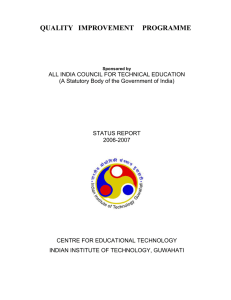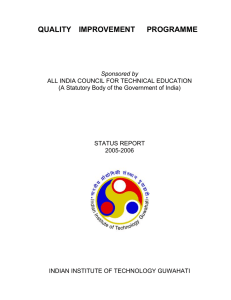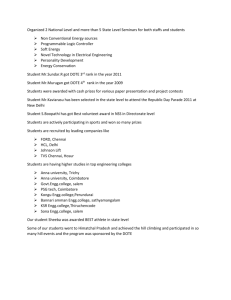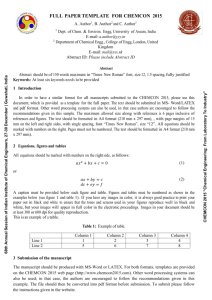QUALITY IMPROVEMENT PROGRAMME
advertisement
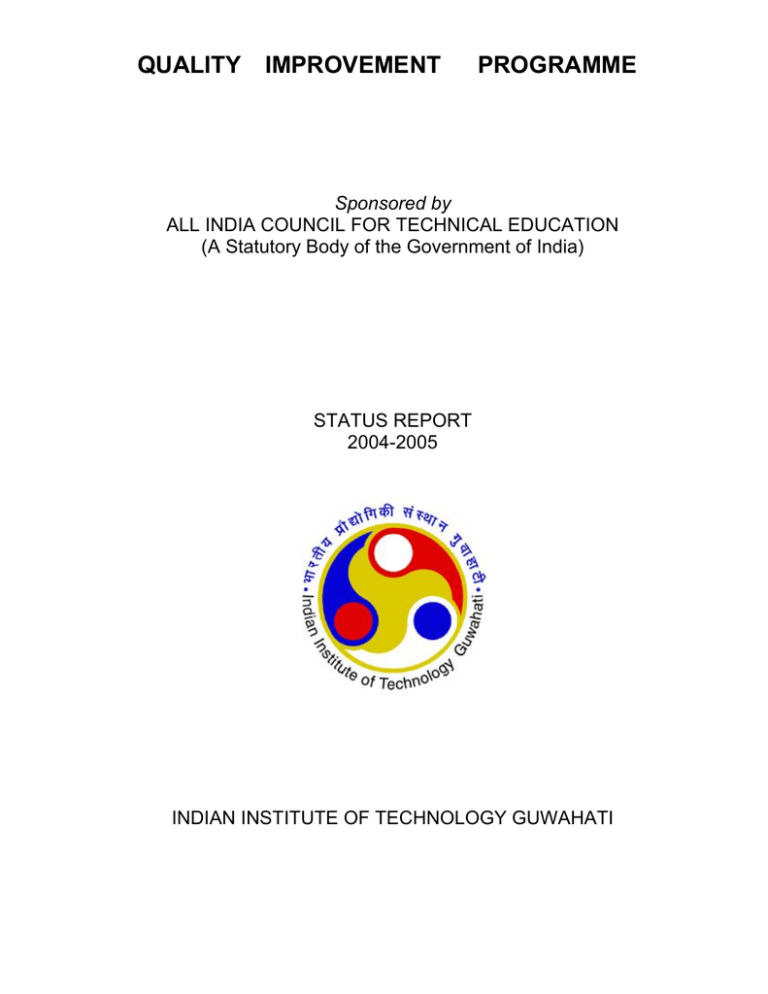
QUALITY IMPROVEMENT PROGRAMME Sponsored by ALL INDIA COUNCIL FOR TECHNICAL EDUCATION (A Statutory Body of the Government of India) STATUS REPORT 2004-2005 INDIAN INSTITUTE OF TECHNOLOGY GUWAHATI PREFACE The report summarises the activities of the overall Curriculum Development Cell and the Quality Improvement Programme at IIT Guwahati during the year 2004-2005. During the year five nos. of teachers have joined the M. Tech. programme and three nos. of teachers have joined for the advance admission to Ph. D. Programme of the institute. Eleven nos. of QIP short-term courses of total twelve weeks were conducted during the year on different topics. The overall guidance of the Director and Dy. Director in the CDC activities is highly appreciated. The valuable support of the members of the Advisory Committee is also greatly acknowledged. Thanks are also due to staff of the QIP and the administrative and accounts staff of the Institute, without their active cooperation, the activities of the QIP/CDC would not have been successfully carried out. The support of AICTE is also gratefully acknowledged. (Dr. R. Tiwari) Coordinator, QIP Quality Improvement Programme Objectives & Programmes Quality Improvement Programme (QIP) of the Ministry of Human Resource Development, Department of Education, Government of India, under the sponsorship of All India Council for Technical Education, New Delhi has been in operation at the IIT Guwahati since 2003-2004. This programme has mainly three component: • M. Tech. and Ph. D. Programmes • Short Term Courses • Curriculum Development These three are pursued vigorously at the Institute, with active participation from the faculty of all the Departments. The Programmes (M. Tech. and Ph. D.) are aimed at improving the quality and standard of members of the faculty of AICTE recognized engineering institutions. Programme 1 : QIP Ph. D. During the year 2004-2005, 3 students have been selected for advance admission to Ph. D. programme. The details are as follows: Sl. No. Name of the QIP Scholar Dept. Name of the Parent Institute 1. Mr. Laskar Aminul Islam CE National Institute of Technology, Silchar-788010, Assam 2. Mrs. Bandana Chakraborty Chem. Engg. Assam Engineering College, Jalukbari, Guwahati-13 3. Mr. Arup Bhattacharjee CSE National Institute of Technology, Silchar- 788010, Assam Date of joining - - - Summary Information of the Number of Teachers Admitted to Ph. D. Programme under QIP at Indian Institute of Technology, Guwahati Year-wise Year Ph. D. 2004-2005 3 (for advance admission) Total 3 Summary Information of the Number of Teachers Admitted to Ph. D. Programme under QIP at Indian Institute of Technology, Guwahati State-wise State Year Ph. D. Assam 2004-05 3 (for advance admission) Total nos. of admission 3 nos. Programme 2 : QIP M. Tech. programme During the year 2004-2005, 5 nos. of students have joined this course. The details of them are as follows : Sl. No. Name of the Scholar Name of the Parent Institution of the Scholar Year of Admission Date of joining 1. Smt. Triptimoni Bora Jorhat Engineering College, Jorhat785007, Assam 2004 27-7-04 2. Mr. Hrudaya K. Tripathy Institute of Advanced Computer and Research Prajukti Bihar, Rayagada, Orissa-765002 2004 27-7-04 3. Mr. Saravanakumar K. R.V.S. College of Engg.& Tech., R.V.S. Nagar, Karur Road, Dindigul, Tamilnadu-624005 2004 27-7-04 4. Mr. Nani Gopal Das Balasore College Engineering and Technology, Seragarh, Balasore756060 2004 27-7-04 5. Mr. Prabodh K. Panigrahi Institute of Advanced Computer And Research Prajukti Bihar, Rayagada, Orissa-765002 2004 27-7-04 Summary Information of the Number of Teachers Admitted to M. Tech. Programmes under QIP at Indian Institute of Technology, Guwahati Year-wise Year M. Tech. 2004-2005 5 Total 5 Summary Information of the Number of Teachers Admitted to M. Tech. Programmes under QIP at Indian Institute of Technology, Guwahati State-wise State Year M. Tech. Assam 2004-05 1 Orissa 3 Tamilnadu 1 Total 5 Summary Information of the Number of Teachers Admitted to M. Tech. and Ph. D. Programmes under QIP at Indian Institute of Technology, Guwahati - Department-wise Department No. of Teachers admitted M. Tech. Ph. D. 3 - Civil Engg. (CE) 1 - Mechanical Engg. (ME) 1 - 5 - Computer Sc. & Engg. (CSE) Total Information on Short Term Courses 2004-2005 under QIP: Sl. No. 1 Course Coordinator & Dept. Duration & date Dr. Chandan Mahanta Dept. of Civil Engg. May 31-June 6, 2004 Title of STC Application of Environmental Science and Technology for Sustainable Water Resource Management OBJECTIVES OF QIP Fundamental environmental principles, Present scenario of water resource, Contemporary and Emerging Water Issues, Principle of sustainability in water resource, Environmental management of water resource, Water processing and treatment topics, Environmental technologies for water problems, Surface and Subsurface case studies 2 Dr. Alika Khare, Dept. of Physics July 5-10, 2004 Optoelectronics Topics Integrated Optics (I), Integrated Optics (II) Laser(I), Laser(II), Lab Demo Materials for Optoelectronics Devices(I), Materials for Optoelectronics Devoces(II) Optical Detectors(I), Optical Detectors(II), Optical Communications(I),Optical Communication(II), Lab Demo Fourier Transformation(I), Fourier Transformation (II) Image Processing(I), Image Processing (II) Biophotonics(I), Biophotonics(II) Recent Advances in Photonic Devices for Optical Computing Neural Network, Pattern recognition Circuit Designing and Signal Processing for Optoelectronics based Devices 3 Dr. S. K. Kakoty Dept. of Mech. Engg. July 12-17, 2004 Energy Conservation Practices OBJECTIVE There is no second opinion about the importance of conservation of energy. However, people in general are not aware of the best practices to be adopted for the purpose. The participating teachers of different technical institutions would be benefited in gathering the knowledge pertaining to different ways and means for conservation of energy in various organizations like paper, textile, petroleum and mechanical industries of the region. Moreover, agricultural and farm machineries, electrical equipments /machineries are also widely used by the people of the region. There is a need of concerted effort to conserve and save energy in all such utilities. Besides other measures to be adopted to achieve such a goal, the tribological aspects require sufficient attention to reduce the energy losses in most of the machineries. 4 Dr. S. V. Rao Dept. of CSE July 19-23, 2004 Advanced Algorithms The scope and objective of the course is: *to cover recent algorithmic developments* *in various application areas, like* *Networks,* *Speech processing, distributed algorithms, NLP.* These areas witnessed a phenomenal progress. So, it is necessary to organize a course on Algorithms in various application areas that gives a comprehensive views to participants. 5 Ravi Mokashi Punekar Dept. of Design Sept. 1-7, 2004 Industrial Design Industrial Design is now established as a promising new professional career option for people with a flair for innovation of products and product systems. A number of technical institutions have commenced design programs in Industrial Design to train new generations of aspiring students interested in specializing in Industrial Design/ Product Design. However there is a severe shortage of trained design educators to meet the faculty requirements to teach in these programs. The program offers an introduction to the field of Industrial Design, the knowledge and skill sets required of an industrial Designer and the training inputs required to be given in an educational program in Industrial Design. This short-term course is recommended for teachers in technical and design institutions and practicing professionals who are engaged in industrial design / product design and development activities, architecture, interior design etc. COURSE OBJECTIVES To impart awareness of the subject of Industrial Design and to provide an understanding of its application. To provide hands on experience in the • practice of Industrial Design. • 6 Dr. Debkumar Chakrabarti Dept. of Design Oct. 1-14, 2004 Ergonomics in Engineering Applications Technological advancement is integrated with appropriate application of human compatibility actors; and Ergonomics/ Human Factors helps in solving practical problems relevant to human centered design, humanising work and work environment. It evaluates human facilities, environment, jobs, work methods and equipment to match with the physical, physiological and psycho-sociological capabilities of the users, and thereby reduces the fatigue, errors, discomfort and unsafe operations. Over the years, there have been considerable development in this field and such techniques are being applied to a wider variety of fields. Objectives of this course are to familiarise the participants with the latest developments in “manmachineenvironment” considerations. 7 Dr. P. K. Giri, Dept. of Physics Oct,30 Nov.5, 2004 Virtual Instrumentation and PC based measurements Objectives: 1. To familiarize with the fundamentals and application of virtual instrumentation 2. Need for PC based automated measurements and control 3. Hands on experience on development of applications. Objectives: 1. To familiarize with the fundamentals and application of virtual instrumentation 2. Need for PC based automated measurements and control 3. Hands on experience on development of applications. 8 Dr. M.P. Rajan and Dr. Soumen Maithy Dept. of Mathemetics Nov. 15-20, 2004 Foundations of Computer Science Scope and objective The scope of this course is to address the fundamental aspects of computer science namely, programming, data structures and algorithms. In addition to this, it will provide the basics as well as latest developments in parallel and distributed computing, combinatorial optimization and cryptography. Main objective of the course is, not only to familiarize mathematicians with the fundamentals of computer science but also to help the computer scientists to update their knowledge. 9 Dr. S. Talukdar, & Dr. M. A. Reddy Dept. of Civil Engg. Dec. 2 - 7, 2004 Recent Trend in the Analysis and Design of Highway Bridges Bridges form a major component of infrastructure, which require huge investment. Often they are also important landmark in the terrain. The progress of Bridge Engineering may be considered to be a yardstick of the economic growth of a country. Many new bridges are being constructed in our country while the older ones are strengthened and rehabilitated to retain the historical importance. It is desired that academicians and practicing engineers be equipped with the current state of the art in the Bridge Engineering for teaching, research and field applications. The QIP course is expected to fulfill the purpose. COURSE CONTENTS Traffic aspects of Highway Bridges, Bridge loading: Standard and Practice of different countries, Axle load survey. Geotechnical and hydrological investigation of the bridge site. Analysis and design of RC, PSC and Composite Bridges, Suspension and Cable stayed Bridges, Horizontally curved bridges, Integral Bridges. Analysis and design of abutments, piers and foundations Bridge dynamics: Vehicle induced vibration, Fatigue, Wind and earthquake effect, Bearings. Bridge maintenance, repair and rehabilitation 10 Dr. Debabrata Chakraborty Dr. P. S. Robi, Dept. of Mech. Engg. Dec. 6-10, 2004 Design and manufacturing of composite materials This course will be introductory in nature addressing the fundamental understanding as well as the applications of composite materials. The course has been designed for teachers / research scholars / professionals with an engineering background. Even though the subject of composite material is interdisciplinary in nature, emphasis has been laid in the present course on understanding the basic mechanics and design aspects of structural composites with a brief introduction to manufacturing. COURSE CONTENTS • Introduction to Composite Materials • Micro and MacroMechanics • Failure Theories and Strength Analysis • Design and Manufacturing • Applications of Composites • Introduction to Smart Structures and Analysis • FE modeling of Composite Structures • Future Trends 11 Prof. Anil Mahanta, & Dr. R. Bhattacharjee Dept. of ECE Dec, 10-23, 2004 Recent Trend in Communication Engineering COURSE CONTENT Outlines of the topics that will be covered during the course are as follows: Review of probability theory and stochastic processes Mathematical models for communication channels Band pass signals and systems Signal space representation Signal design for band limited channels Modulation and demodulation techniques Source coding in communication: speech/image Channel coding Modulation and coding trade offs Synchronization issues Equalization and diversity systems Multi-channel and multicarrier systems Encryption and decryption Spread spectrum techniques Communication over fading channels Multiple access techniques for wireless communication MIMO and space time wireless communication DSP and FPGA based reconfigurable architectures for communication systems. Overview of recent advances in Satellite and Optical communication. Introduction to WLAN (IEEE 802.11) UWB (IEEE 802.15) * Laboratory classes on some selected topics will be held. COURSE MATERIAL Lecture slides and other reference materials will be provided on CD as well as in the printed form. Information on Short Term Courses for financial year 2004 – 2005 under ISTE Scheme : Sl. Course Coordinator No. & Dept. 1 2 Duration Prof. D. S. De & Dr. B. P. Mandal Chemical Engg. Dec.6 -9, 2004 Dr. Rajiv Tiwari & Dr. S. K. Dwivedy Dec.2024, 2004 Title of STC Advanced Separation Process Separation processes are major parts of the chemical process industries and exclusive purview of chemical engineers. In chemical industry, separation techniques are mainly used for extracting valuable chemicals from mixtures, removing impurities from raw materials, purification of products, removal of contaminants and valuable constituents from effluent streams. To accomplish a separation, there are usually several competing techniques available. Each technique has to be analyzed in terms of economic conditions, customer requirements, and applicable stringent environmental regulations. In view of the above the industries and academia joined hands in tandem to develop newer separation processes, which should be more efficient, cheaper, safer and cleaner. Even though the basic principles of separation processes remain the same, for keeping pace with the development, scientists and engineers may occasionally like to familiarize themselves with the recent advances in the separation technologies. The proposed short-term course on Advanced Separation Processes is intended to provide such an opportunity to professionals from academia, R&D organization and Industries. Finite Element Analysis and Identification in Rotor-Bearing Systems Teachers and professional engineers need to be introduced the fundamentals of Finite Element Analysis & Identification in Rotor-Bearing Systems. Rotor-bearing systems of modern high-speed rotating machineries constitutes a complex dynamic system. With the advancement in high-speed machinery and increase in the power/weight ratio, the determination of the rotor dynamics characteristics through reliable finite element modeling has gained prime importance. The advancement in modern instrumentation, computational capabilities and numerical methods has helped in the analysis and identification of these complex systems. In this course teachers/scientists/engineers are given a complete understanding of Rotor-Bearing systems and allied areas from very basic vibrations to advanced modeling, analysis and identification techniques. This course helps the participants in understanding the rotordynamic problems in practical situations. They will be to implement the ideas of modeling, simulation and techniques for dynamic analysis and identification in practical situations and for research purpose. COURSE CONTENTS Introduction to linear and non-linear • · dynamic systems, finite element methods, and fracture mechanics. Analysis in rotor-bearing systems: Critical • · speeds, unbalance response, gyroscopic effects and instability. Bearings: Tribology of bearings – Fluid film • · and rolling element bearings. Identification in rotor-bearing systems: • · Balancing of rotors, bearing dynamic parameter estimation, crack model parameter estimation. Hands-on laboratory classes on dynamic • · balancing of rotors, bearing dynamic parameter estimation etc. Hands-on laboratory classes on FEM • · packages and Matlab. Information on Curriculum Development Cell 2004 - 2005 under QIP: The following CD Cell projects for financial year 2004 – 2005 under QIP Scheme were undertaken: Sl. No. Name of the Proposer & Dept. Type of project Title of the project Expected time of completion 1 Dr. P. K. Giri Dept. of Physics Lab. manual B. Tech. Physics Laboratory One year 2 Dr. D.Chakraborty Dept. of Mech. Engg. Lecture notes Design of Machine Elements Two years 3 Dr. S.N. Bora Dept. of Maths. Lecture notes Differential Equations, special Functions and Integral Transforms Two years 4 Dr. N.V. Kalpakam Dept. of Maths. Lecture notes Fourier Theory One year 5 Dr. S. K. Dwivedy & Dr. R. Tiwari, Dept. of Mech. Engg. Lecture notes Dynamics of machinery One year 7 Dr. Liza Das Dept. of HSS Lecture notes Language and Communication Two years 8 Dr. P. Mahanta Dept. of Mech. Engg. Lecture notes Advanced Engineering Thermodynamics One year 9 Dr. Manab Kr. Das Dept. of Mech. Engg. Lecture notes Fluid Mechanics Two years 10 Dr. S. V. Rao Dept. of CSE Lecture notes Discrete Mathematics One year 11 Dr. U. K. Saha Dept. of Mech. Engg. Lecture notes Jet Propulsion One year Early Faculty Induction Programme (EFIP): The quality of technical education basically depends on the quality of teachers. Adequately qualified, highly competent and motivated faculty is becoming scarce in technical institutions allover the country. The shortage of faculty has become more acute due to rapid expansion in technical education. AICTE is giving a high priority to attract bright young persons to teaching profession. In order to attract bright engineering graduates to teaching, MHRD operated the "Technical Teachers Training Scheme" in 1950's and 60"s. With similar objectives, AICTE has taken an initiative to launch a revised programme "Early Faculty Induction Programme (EFIP)" with distinct features. The scheme aims at attracting bright young graduates in Engineering & Technology pursuing PG Programme to take teaching as their career by providing certain incentives. In the Early Faculty Induction Programme, bright young Engineering & Technology students pursuing in their PG programme ( M. Tech. or Ph.D) will be selected and will be given an opportunity to take up teaching career in Engineering Colleges. The following EFIP scholars were selected for the EFIP - 2004 : Name SC/ST Department Institution Sl.No. 1 Mr. Gandhi Pitta SC Chemical Engg. IIT Guwahati 2 Ms. Dipti Gagneja GN CSE IIT Guwahati 3 Ms. Preeti Malakar GN CSE IIT Guwahati 4 Ms. Aditi Datta GN Electrical Engg. N.I.T. Silchar 5 Ms. Tulika Bhattacharjee GN Electrical Engg. N.I.T. Silchar 6 Mr. A S S R Karuna Kumar GN Mech. Engg. IIT Guwahati 7 Mr. Mahadevan P GN Mech. Engg. IIT Guwahati 8 Mr. Raj Kamal Tiwari GN Mech. Engg. IIT Guwahati Course on Pedagogy and Teaching Skills The course was held between 3rd Jan., 2005 and 12th Jan., 2005 - for a total duration of 10 days at the Conference Hall of the Guest House IITG. There were a total of 9 registered participants and on an average 4 unregistered participants in the programme. National Symposium on Engineering Education QIP Coordinator visited IISc Bangalore during 25 - 26 Feb., 2005 to present a paper (Title: Engineering Education in North - East India : A Survey) in the National Symposium on Engineering Education (NSEE - 2005). ---------------------********************-------------------------
